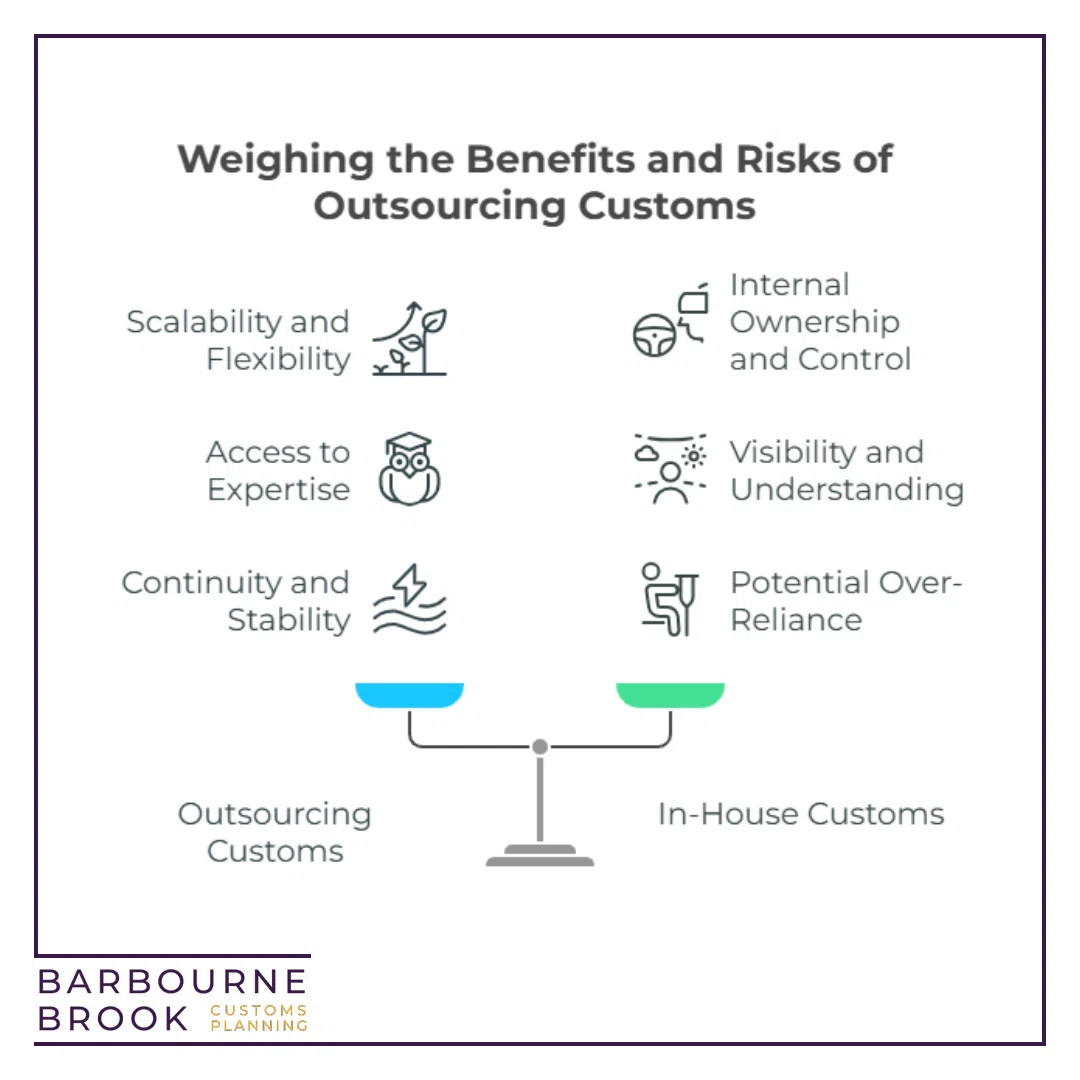For companies trading internationally, customs compliance is no longer a back-office detail, it’s a strategic area of both risk and opportunity. The question isn’t whether to invest in customs capability, but how to structure that investment: build an in-house team, outsource the function, or take a more blended approach. In this post, we explore the pros and cons of in-house and outsourced models, and why a hybrid approach often proves the most resilient, cost-effective, and future-ready solution.
The In-House Model: Ownership with Overhead
Bringing customs expertise in-house gives companies full control over their compliance function. The team is embedded within the business, aligned with its culture, and can build relationships with internal stakeholders. Being close to operations also enables faster response times when handling day-to-day queries or planning import and export activity. However, this model comes with trade-offs.
Cost and Headcount
According to the BLT Market Survey Report, a senior customs manager will likely command a salary of £85,000 or more, with junior roles ranging from £35,000 to £50,000. The total cost becomes significantly higher once pensions, bonuses, training, and holiday cover are factored in.
Employment Risks
Permanent staff bring HR challenges, including sickness, performance issues, recruitment mistakes, and the difficulty of retaining talent in a competitive hiring market.
Capability Gaps
No single hire can cover every aspect of customs. For example, if inward processing becomes a priority, a generalist may lack the deep technical knowledge required.

The Outsourced Model: Expertise and Flexibility
Outsourcing customs to a specialist consultancy or freight forwarder can be attractive for many businesses.
Scalability
Outsourcing allows you to scale resources in line with trade volumes or complexity, without disrupting internal restructuring. Customs workloads naturally fluctuate as projects are implemented or audits occur.
Expertise on Tap
A strong outsourced team can manage day-to-day processing while also offering access to subject matter experts in specialist areas such as valuation, origin, or special procedures. They will likely draw on broader experience and invest in the latest subscriptions and customs technology.
Future-Proofing
With an external team managing your customs function, the business retains continuity even when internal staff change. Supply chains and staffing structures may shift quickly, but a stable external partner helps maintain consistent, informed compliance through periods of transition and disruption.
That said, outsourcing isn’t without risk. Over-reliance on third parties can limit internal understanding and weaken the ability to challenge or manage the relationship. When customs becomes “someone else’s problem,” businesses risk losing visibility and internal ownership.
Why Hybrid Is the Future
Few businesses find that an entirely in-house or wholly outsourced model meets all their needs. A hybrid approach combines the strengths of both, balancing control, capability, and cost.
Internal Resource Provides Proximity and Ownership
An in-house team stays close to the business. It manages day-to-day operations, ensures alignment between compliance and commercial goals, and retains valuable institutional knowledge.
External Support Brings Depth and Scalability

A trusted external partner enhances internal capability. Whether it’s handling complex projects, advising on strategic matter and can step in with additional resources as needed. A specialist team provides the depth and scale that internal teams alone may struggle to sustain.
Independence and Oversight
A hybrid model also introduces a critical advantage: independence. With external involvement, businesses can audit their customs declarations impartially, identify compliance risks early, and maintain a layer of oversight that an internal-only approach can lack.
Building a Smarter Customs Capability
Think of the hybrid model as co-piloting your customs function. Your internal team stays close to day-to-day operations, while an expert partner supports, strengthens, and audits from the outside, helping to build internal resilience.
At Barbourne Brook, this is precisely how we work. We provide strategic customs support, deliver knowledge transfer to internal teams, and offer independent audits that ensure visibility and control. We’re not just here to do the work, we’re here to help your business get better at doing it.
For businesses seeking reliability and flexibility, the hybrid model is a smarter, more strategic approach.
Is Your Current Model Fit for the Future?
Before deciding how to structure your customs capability, it’s worth reflecting on a few critical questions:
- Do we have a clear and confident understanding of our customs landscape?
That includes our business processes, procedures, risks, and responsibilities. - What is the material value of our customs duty under management?
Understanding this can help assess whether your resourcing matches your exposure. - If our customs or import manager left tomorrow, how much knowledge would remain accessible?
Institutional knowledge gaps can leave businesses vulnerable during transitions.
- Can our current team confidently handle large projects, such as audits or procedural changes, without impacting day to day responsibilities?
Stretching limited capacity can lead to missed opportunities or compliance risks.
- Do we independently audit our declarations, or assume no news means no problems?
A lack of visibility can mask issues that only surface when it’s too late. - How much of our customs strategy is proactive, rather than reactive?
Customs should support broader commercial goals, not just tick the compliance box.
These questions often reveal that while day-to-day compliance may appear under control, gaps in strategic oversight, resilience, and long-term readiness can remain hidden.
Let’s get in touch …
Related Posts
24 November 2025
£8.5m Ruling Clarifies: Import VAT on Repairs Is Unrecoverable Without Special Procedures
A recent First-tier Tribunal case…
13 November 2025
Customs: Cost Centre or Value Creator? | Why Smart Businesses Are Rethinking Customs in the Supply Chain
For many boardrooms, customs is still…
5 November 2025
ASOS Customs Dispute: Why Valuation Is Now A Boardroom Issue
ASOS’s valuation dispute with German…


